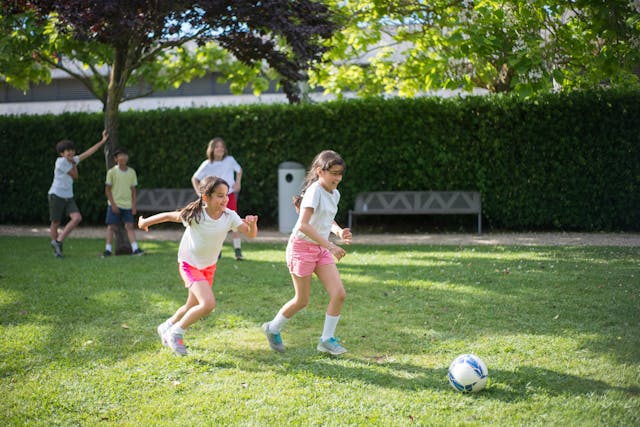Building Strong Study Habits from a Young Age
Establishing robust study habits from an early age is paramount for academic success and lifelong learning. These habits lay the foundation for effective learning strategies, time management skills, and self-discipline. Study habits encompass the behaviours, techniques, and practices that students employ to learn, retain, and recall information effectively. Developing good study techniques from a young age is essential as it sets the stage for future learning endeavours. Children who learn how to study efficiently early on are better equipped to tackle academic challenges with confidence and competence.

Advantages of Building Strong Study Habits
- Academic Success: Children who develop strong study habits are more likely to excel academically. They learn to manage their time efficiently, stay organized, and engage in effective study techniques such as active reading and note-taking.
- Enhanced Learning Skills: By practicing good learning methods, young learners improve their comprehension, retention, and critical thinking abilities. They become adept at analyzing information, synthesizing concepts, and applying knowledge to real-world situations.
- Increased Confidence: Mastering study habits instills confidence in children, as they feel prepared and capable of tackling academic challenges. This confidence extends beyond the classroom and positively impacts their overall self-esteem and self-efficacy.
- Long-term Success: Strong study techniques cultivated during childhood set the stage for lifelong learning and success. Children develop a positive attitude towards education, embrace a growth mindset, and become lifelong learners who continually seek knowledge and self-improvement.
Disadvantages of Neglecting Study Habits
- Poor Academic Performance: Children who lack effective study habits may struggle academically, leading to lower grades and academic setbacks. Without proper study skills, they may find it difficult to understand complex concepts, complete assignments on time, or perform well on exams.
- Increased Stress and Anxiety: Neglecting study habits can result in heightened stress and anxiety for children, especially during exam periods or when faced with challenging coursework. They may feel overwhelmed by the workload and unprepared to meet academic expectations.
- Limited Future Opportunities: Without strong study habits, children may miss out on valuable learning opportunities and hinder their future prospects. Poor academic performance can impact their ability to gain admission to higher education institutions or pursue desired career paths.
Key Features of Effective Study Habits
- Time Management: Encourage children to allocate dedicated study time each day and prioritize tasks based on importance and deadlines. Teach them how to create study schedules and set achievable goals to stay on track.
- Active Learning Techniques: Promote active learning strategies such as summarizing content, creating flashcards, and engaging in discussions or group study sessions. Encourage children to ask questions, seek clarification, and apply concepts in real-life scenarios.
- Organization and Planning: Emphasize the importance of staying organized by keeping study materials, notes, and assignments neatly arranged. Teach children how to use planners, calendars, or digital tools to plan their study sessions and manage deadlines effectively.
- Self-discipline and Persistence: Foster self-discipline and perseverance by encouraging children to stay focused, avoid distractions, and maintain a positive attitude towards learning. Teach them the value of persistence in overcoming challenges and achieving long-term goals.
Tuition for Primary School
Incorporating tuition for primary school can be a valuable supplement to building strong study habits. Tuition provides additional academic support, personalized instruction, and targeted remediation for areas of weakness. It offers children the opportunity to receive individualized attention, ask questions, and receive feedback from qualified educators. Furthermore, tuition can help bridge learning gaps, reinforce classroom concepts, and boost confidence in challenging subjects such as mathematics, language arts, and science.
Significance of Building Strong Study Habits:
- Academic Success: Strong study habits lay the groundwork for academic success by helping children develop effective learning strategies, time management skills, and self-discipline. Children who cultivate these habits are better equipped to handle the demands of schoolwork, understand complex concepts, and perform well on exams.
- Lifelong Learning: By instilling strong study habits early on, parents and educators foster a love for learning in children that extends beyond the classroom. Children who develop a habit of studying regularly and engaging with material actively are more likely to become lifelong learners who seek out knowledge and pursue intellectual curiosity.
- Personal Development: Building strong study habits contributes to children’s personal development by fostering skills such as perseverance, resilience, and self-motivation. Children learn to overcome obstacles, manage setbacks, and take ownership of their learning, which are valuable attributes that benefit them in all areas of life.
- Future Success: Thef study habits children develop in their formative years have a significant impact on their future success in higher education and the workforce. Strong learning methods contribute to better academic performance, higher educational attainment, and greater career opportunities in adulthood.
Practical Strategies to Achieve Strong Study Techniques:
- Establish a Consistent Study Routine: Set aside dedicated time each day for studying and homework, creating a consistent study routine that becomes a regular part of the child’s schedule.
- Create a Productive Study Environment: Designate a quiet, well-lit study space free from distractions where children can focus and concentrate on their work.
- Teach Effective Study Techniques: Teach children how to use active learning techniques such as summarizing, highlighting, and quizzing themselves to engage with material actively and improve comprehension.
- Encourage Time Management: Help children learn to manage their time effectively by breaking tasks into manageable chunks, setting realistic goals, and prioritizing assignments based on deadlines and importance.
- Provide Positive Reinforcement: Recognize and praise children’s efforts and achievements in developing strong study habits, reinforcing their motivation and commitment to learning.
Conclusion
Building strong study habits from a young age is essential for fostering academic success, enhancing learning skills, and promoting lifelong learning. By instilling effective study habits early on, children develop the skills, confidence, and resilience needed to excel academically and pursue their goals with determination. Through a combination of time management, active learning techniques, organization, and self-discipline, children can lay the groundwork for a lifetime of educational achievement and personal growth. Additionally, incorporating tuition for primary school can provide valuable academic support and enrichment, further empowering children to reach their full potential.









